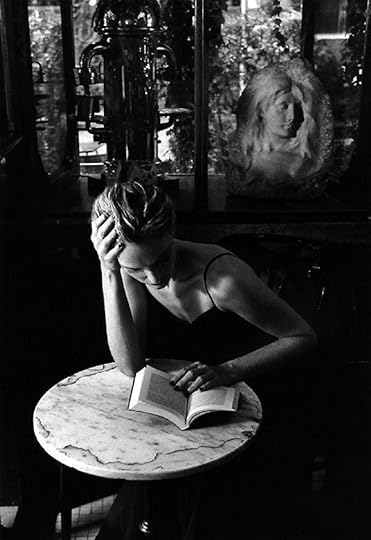A Dispatch from the Middle
Quotes, in general, are a bit like little prayers for me. These bits of wisdom from people who are far more accomplished than I am, who have been through the wringer and have come out on the other side, help me look at things outside of my own headspace, talking me out of my tree one foothold at a time.
They are especially useful when I’m stuck, unsure of whether my big idea was ever a good idea or when I’m trudging my way through the middle of a story.
“If you’re in the middle of the ocean with no flippers and no life preserver and you hear a helicopter, this is music. You have to adjust your needs to the moment.” –Tom WaitsThe middle is a notoriously thorny place to be. We rarely talk about hitting middle age, going to Middle School, being mid-route, the Middle Ages in glowing terms. Rather, the middle seems more often than not to conjure images of strife, darkness, confusion, and a general slowing down of progress. It’s the waiting place Dr. Seuss writes about in his book of the same name.
“You can get so confused that you’ll start in to race down long wiggled roads at a break-necking pace and grind on for miles across weirdish wild space, headed, I fear, toward a most useless place. The Waiting Place…” he writes.For a writer, the middle, “the waiting place,” is that stage in a manuscript where we no longer feel the wind at our backs, the way we did when we launched our tale or see the light at the end of the tunnel, the way we do as we’re marching towards our fireworks of an ending. The middle of a novel, trilogy, or series is a place that’s hard won, chapter by chapter. Because it is such a slog, so filled with intricacies that must tie the characters and plot points together in a way that makes sense, the magic that lights up the words, makes the world come alive for a writer and reader, can feel as if it’s fading away.
The middle is, after all, when most first-time fiction writers kick their dreams to the curb and give up on ever completing their novel. And when a reader might struggle to make it through a narrative that seemed promising at the start but got weighed down.

But the middle is so worth it. If we are conscientious and dedicated to remembering what made us fall in love with a premise, a theme, a story, a hero or heroine, the middle is where all the real growth happens. It’s the place and time where our characters discover who they really are, what they’re made of, and which potential lovers are worthy of their hearts. It’s where they fall down and make colossal mistakes, then have to figure out how to fix them. It’s where they lose their innocence and not only have to make peace with their discoveries, but must endeavor to turn trouble, even tragedy, into triumph.
“It is unthinkable for a Frenchman to arrive at middle age without having syphilis and the cross of The Legion of Honor.” –Andre Gide, winner of the Nobel Prize for LiteratureIn my case, the middle has involved finishing the second BIG book in the “Breath” series, titled “Of Sand and Bone.” I won’t pretend; it’s been a daunting task. Not only does OSAB have to work as a stand-alone novel with its own beginning, middle and end, but it has to serve as the middle point for the series, pushing forward the machinations of the plot without losing the framework of the epic, and continuing to develop the characters who have a purpose and objective in all of the books. I have felt a bit like one of those variety show acts, where a guy comes on to spin plates with one hand, juggle with the other, all while skateboarding.

I think it’s been worth it.
Ultimately though, it’s you, the reader, who will be the judge. So, I leave you not with another quote, but a dispatch from the middle.
Cairo, 1902, deep in the middle of “Of Sand and Bone.”By Yours Truly
“I have to get out of here,” I blurt out before Ripley or his father can even utter a greeting. “I’m going to go see my father in Aswan.”
Even I can see how jagged my movements are as I make my way through their sitting room, intent on going up and packing my things.
“Leila,” Ripley says. “What on earth?”
As happy as I am to see him, even Ripley cannot console me. “Nothing. Everything. I just miss him and, with all that’s happened, I think it would be best if I go.”
Dr. Davies looks to Ripley in distress, and I let my face fall into my hands. I’ve made a mess of this already, I can see, and the two of them must think I need an alienist. Steeling myself, I put my arms to my sides, trying my best to keep my lips from quivering. Poor Ripley steps toward me, but I put out my hand for him to stop.
“You should never have let her go to that hotel with you and the Lieutenant General, for goodness sake!” Dr. Davies says. “A woman, particularly of Leila’s delicate age, shouldn’t be subjected to—”
“Oh, Dr. Davies, for the love of God, I’ve seen more blood and death than you ever will in your one measly life!”
I gasp and bite down. “I’m sorry,” I mumble. “I don’t know what came over me.”
“Dad, if you’ll excuse us, I’m going to take Leila upstairs.”
I feel Ripley’s hands upon my shoulders and know instantly how wrong I was. I walk into his arms, needing every bit of his comfort, and he holds me better than anyone ever could.
“Yes, yes, of course,” I hear Dr. Davies say. “She needs to rest.”
That’s the last thing I need, I want to say. I breathe deeply into Ripley’s chest, where his heart beats, wishing it could be bare and that I could feel the raw warmth of it.
Ripley stoops down and hooks his arm beneath my legs, lifting me up. He carries me up the stairs and takes me to my room, laying me down upon the mint coverlet. Sweetly, he removes my shoes and places them next to my bed.
“What happened?”
“I don’t know.”
He takes my hand and sits at the edge of my bed just as I had done to poor Edna’s mother.
“I wish it was just that I was going mad,” I whisper. “A frightened girl who has seen too much for her sensitive nature.”
Ripley’s finger touches the hollow in my neck and my whole body comes alive to him. “A sensitive nature?” he teases. “Hardly.”
I tell him everything that happened at Mrs. Watson’s, the whole story coming out in a torrent. He listens carefully, stroking my head, and holding my hand.
“I feel as if we’re being haunted,” I tell him. “Like the stories in my books.”
He leans over and kisses me so tenderly. My temple, my cheek, my lips.
“What if we’re not the ones being haunted, but those doing the haunting?” I whisper. “What if, somehow, all of this is our fault?”
Ripley unbuttons his shirt and holds my hand to his heart. I want to bore through his chest and hold it, red and beating, in my hands. I want to crawl inside him and shelter behind his bones. But his eyes give me strength. The rivers of amber and blood within them rush and glimmer.
“Then I shall make it right. If it’s the last thing I do.”




